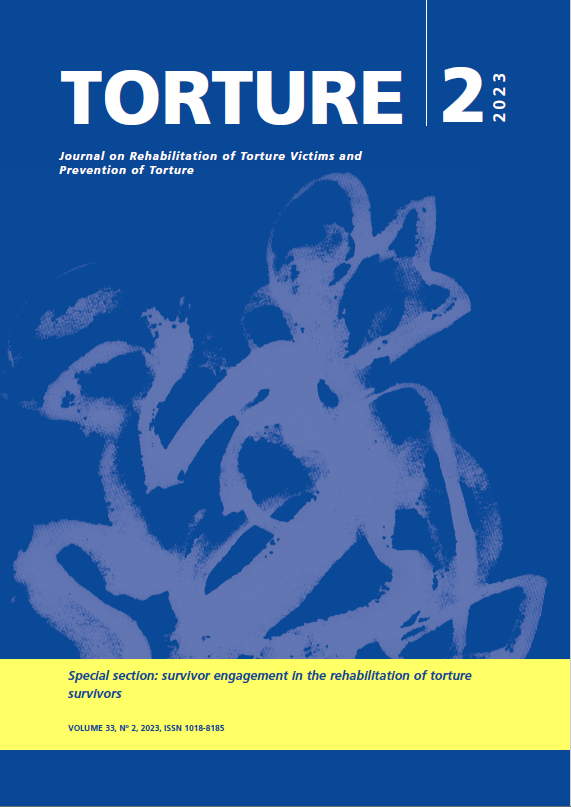The community pillars project: engaging survivors as cross- cultural facilitators in Aotearoa/ New Zealand
DOI:
https://doi.org/10.7146/torture.v33i2.135769Keywords:
Mental health, Survivor engagement, Cultural bridging, Community servicesAbstract
Introduction: Communities who have fled torture and persecution in their home countries can find it difficult to access services in new cultural settings. Past research has shown that it is helpful to provide cultural bridging services to form a connection between locally-trained professionals and newly relocated communities. Method: This article presents, from a practitioner’s perspective, a case example of cultural bridging involving a pilot programme to train torture survivors and former refugees to become Cross-Cultural Facilitators supporting mental health services for displaced communities. Results: The Cross-Cultural Facilitator role has become an integral part of the case example agency’s services. Internal agency reviews of the Cross-Cultural Facilitators’ work shows that they have been continuing to operate successfully through challenging times, including the many societal disruptions and stressors entailed in the Covid-19 pandemic. The agency has also gathered notable anecdotal evidence that the pilot training programme has been positively impactful and supportive not only for the Cross-Cultural Facilitators but for the communities they serve. Discussion: Healthcare workers and civil society organisations have an important role to play in supporting survivors to engage in this form of cultural facilitation aimed at addressing the consequences of traumatic experiences at a community level. In doing so, they must balance efforts to empower survivors and former refugees to participate as agents of change with a duty of care not to push individuals into roles or settings that may diminish their own wellbeing.
References
Dawnier, K & Trotman, R. (2021) Evaluation of Refugees as Survivors New Zealand’s Community Support. Retrieved from: https://weavingchange.nz/wp-content/uploads/2021/05/Final-RASNZ-Community-Programmes-Evaluation-Report-22-March-2021.pdf
Durie M. (2011) Indigenizing mental health services: New Zealand experience. Transcultural Psychiatry, 48(1-2):24-36. doi:10.1177/1363461510383182
Ferns, M., Stephens, M., Sama, B. N., Maurice, T., Perinpanayagam, U., Stocker, F., Malihi, Z., & Marlowe, J. (2022). Safe Start. Fair Future: Refugee Equality. Centre for Asia Pacific Refugee Studies and Asylum Seeker Support Trust, February.
Foundation House - Victorian Foundation for Survivors of Torture (2017). A Framework For Community Capacity Building. Retrieved from: http://www.foundationhouse.org.au/wp-content/uploads/2017/11/FOUNDATION-HOUSE-COMMUNITY-CAPACITY_SCREEN_COMB.pdf
Hall, B.L. and Tandon, R. (2017) ‘Participatory research: Where have we been, where are we going? – A dialogue’. Research for All, 1 (2): 365–74. DOI https://doi.org/10.18546/RFA.01.2.12
Herati, H. & Meyer, S. B. (2020). Mental health interventions for immigrant-refugee children and youth living in Canada: a scoping review and way forward. Journal of Mental Health. https://doi.org/10.1080/09638237.2020.1818710
Liu, S-W. (2013). Bilingual Social Workers in Mental Health Service Provision: Cultural Competence, Language, and Work Experience. Asian Social Work and Policy Review 7, pp. 85–98
Mortensen, A. (2020) Refugee Resettlement and Support Services in the Auckland Region: A Study in the Era of COVID 19. Retrieved from: https://rasnz.co.nz/wp-content/uploads/2020/11/RASNZ-Refugee-Resettlement-and-Support-Services-in-the-Auckland-Region-2020-Summary-Report.pdf
O'Keefe, V. M., Cwik, M. F., Haroz, E. E., & Barlow, A. (2021). Increasing culturally responsive care and mental health equity with indigenous community mental health workers. Psychological Services, 18(1), 84–92. https://doi.org/10.1037/ser0000358
Poole, G. & Galpin, G. (2011). Prevalence of victims of torture in the health screening of quota refugees in New Zealand during 2007-2008 and implications for follow-up care. New Zealand Medical Journal, 8;124(1338):18-24.
RASNZ (2021) 25 Years—RASNZ. Retrieved from: https://rasnz.co.nz/wp-content/uploads/2021/11/RASNZ-booklet-2021-WEB.pdf
RASNZ (2022) RASNZ Community Pillars Phase 3: Mental Health Destigmatisation Programme for Communities from Refugee Backgrounds Family Violence Prevention and Child Protection. Report for OTINGA KŌRERO Ethnic Communities Development Fund ECDF-2022-187503
Reeler, T., Chitsike, K., Maizva, F., & Reeler, B. (2009) The Tree of Life: a community approach to empowering and healing the survivors of torture in Zimbabwe. Torture: Quarterly Journal on Rehabilitation of Torture Victims and Prevention of Torture; 19(3):180-193. PMID: 20065537.
Salami, B., Salma, J. & Hegadoren, K. (2018) Access and utilization of mental health services for immigrants and refugees: Perspectives of immigrant service providers. International Journal of Mental Health Nursing. https://doi.org/10.1111/inm.12512
Sheth, N., Patel, S., O’Connor, S. Dutton, M. (2021). Working Towards Collaborative, Migrant‑Centered, and Trauma‑Informed Care: a Mental Health Needs Assessment for Forced Migrant Communities in the DC Metropolitan Area of the United States. Journal of International Migration and Integration. https://doi.org/10.1007/s12134-021-00884-4
Ward, C., Lescelius, J., Jack, A., Naidu, R. N., & Weinberg, E. (2018). Meeting the needs and challenges of migrants and former refugees in the Nelson and Tasman regions. Report prepared for the Nelson Multicultural Council. Wellington: The Centre for Applied Cross-cultural Research, Victoria University of Wellington. Retrieved from: https://www.victoria.ac.nz/__data/assets/pdf_file/0004/1741432/Meeting_the_needs_and_challenges_of_migrants_and_former_refugees_in_the_Nelson_and_Tasman_regions_May2018.pdf

Downloads
Published
How to Cite
Issue
Section
License
Copyright (c) 2023 Torture Journal

This work is licensed under a Creative Commons Attribution-NonCommercial-NoDerivatives 4.0 International License.
We accept that some authors (e.g. government employees in some countries) are unable to transfer copyright. The Creative Commons Licence Attribution-NonCommercial-NoDerivatives 4.0 International (CC BY-NC-ND 4.0) covers both the Torture Journal and the IRCT web site. The publisher will not put any limitation on the personal freedom of the author to use material contained in the paper in other works which may be published, provided that acknowledgement is made to the original place of publication.

